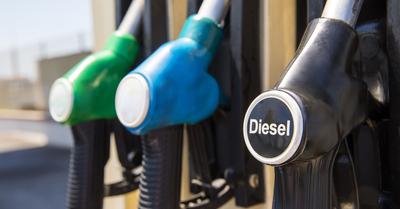Diesel engines have many benefits, but they also require increased maintenance. So you should know what blow by is and how to deal with it.
Blow-by in a diesel engine is when the air-fuel or combustion gas mixture leaks into the engine crankcase. Typically, this leak occurs through the engine pistons and cylinder wall, causing louder engine noises, increased fuel consumption, and more exhaust fumes.
As a diesel engine owner, it's essential to know the causes and signs of blow-by to keep your engine in tip-top shape. Recognizing the symptoms early on can save you from costly repairs and engine damage. You will learn what leads to blow-by, the warning signs to watch out for, and the measures to take to fix this issue.
Key Takeaways
- Blow by in a diesel engine occurs when air-fuel mixture or combustion gas leaks through the pistons and cylinder wall.
- Increased exhaust smoke, poor fuel economy, sludge build-up, and added crankcase pressure are signs you have excessive engine blow-by.
- A small amount of blow by is normal in most diesel engines.
This article may contain affiliate links where we earn a commission from qualifying purchases.
What Is Blow By In A Diesel Engine?
Blow by in a diesel engine occurs when a mixture of air, fuel, and gasses from the combustion chamber escape into the crankcase. This happens through the small gap past the piston rings and cylinder walls.
These gasses, a mix of air, unburned fuel, and vaporized oil, escape into the crankcase that houses the crankshaft — one of the critical components that convert reciprocating motion into rotational motion.
Perfectly-sealed diesel engines would keep all combustion gasses contained in the combustion chamber. But the seals created by the piston rings are not perfect. A small amount of combustion gas leaks into the crankcase during every cycle.
Excessive blow-by can cause various problems, from reduced engine performance to increased emissions. Over time, the escaping gasses can create pressure within the crankcase, leading to oil leaks and possible engine damage.
How Much Blow-by Is Normal In A Diesel Engine?
Every engine, including diesel engines, have at least a small amount of engine blowby. In general, a well-maintained diesel engine should have minimal observable blow-by.
For example, a 12-liter engine should have about 1.5 cfm of blow-by. This is considered normal for an engine this size, and it won’t put any added wear on the cylinder wall or cylinder bore. Some engine manufacturers and mechanics use a rule of thumb based on engine displacement.
For example, they might consider acceptable up to 6 cubic feet per minute (CFM) of blow-by gas per 100 cubic inches of engine displacement. So, for a 500 cubic inch engine, up to 30 CFM of blow-by might be considered normal.
If you're noticing excessive smoke, a decrease in engine performance, an increase in oil consumption, or other signs of excessive blow-by, it's a good idea to have your engine checked by a professional.
What Causes Blow By In A Diesel Engine?
Blow by in a diesel engine occurs when combustion gasses like air, fuel, and moisture escape the combustion chamber and enter the crankcase through the space between the piston rings and the cylinder walls.
There are several reasons you might experience this issue in your diesel engine. Let’s review a few of the most common below.
Worn-out or Broken Piston Rings
One cause of blow by can be worn pistons. As your engine experiences wear and tear, the pistons might become smaller, which creates more space between the piston rings and the cylinder walls, allowing combustion gasses to escape.
To prevent this, ensure you perform regular engine maintenance and address any piston-related issues as soon as possible. Otherwise, you’ll have no choice but to replace piston rings in your vehicle.
Properly functioning piston rings create a tight seal between the piston and the cylinder wall. However, when they wear out or become damaged, they can't create this seal, resulting in increased crankcase pressure and blow-by.
Damaged Cylinder Walls
Lastly, blow by can be caused by damaged or worn cylinder walls. These can create gaps that allow combustion gasses to pass through and enter the crankcase.
Regular engine inspections can help ensure the cylinder walls are in good condition and address any issues before they further damage your engine.
Remember, routine maintenance and inspections are crucial in preventing blow by and keeping your diesel engine running smoothly.
How To Know If Your Diesel Engine Has Blow-By
Knowing whether your diesel engine has blow-by is critical to maintaining its performance and longevity. Here are some signs to look for to spot the issues sooner rather than later.
Visual Inspection of Exhaust Smoke
One of the most common signs of excessive blow-by is increased exhaust smoke. If you notice thick, blue, or gray smoke coming from your exhaust, this may be due to oil being burned along with the fuel.
This burning can happen when blow-by causes oil to be carried into the combustion chamber. Usually, this means something is wrong with the air-fuel mixture, or you have worn piston rings and engine bearings.
Excessive Oil & Fuel Consumption
A diesel engine with blow-by often consumes more oil than normal. This is because the combustion gasses escaping past the piston rings can carry tiny droplets of oil with them, which then get burned off in the combustion process.
If you need to top up your engine oil more frequently than usual, it might be a sign of excessive blow-by. Frequent changes in the engine’s oil can help you spot this soon rather than later.
Performance Reduction
A loss of engine power and efficiency can also be a sign of blow-by. The blow-by gasses contain the fuel that hasn't been burned, which means your engine isn't converting as much of the fuel into useful power.
This inefficiency can manifest as a noticeable reduction in power, especially when climbing hills or accelerating, and a decrease in fuel economy.
Pressure Build-up in the Crankcase
Excessive blow-by can cause a build-up of pressure in the engine's crankcase. This pressure can lead to oil leaks as the pressurized gasses push oil past seals and gaskets.
You might notice oil spots under your vehicle when it's parked, or oil spraying out from the dipstick tube when the engine is running. This can lead to engine failure and excessive oil burning too.
Soot & Sludge Build-up
Blow-by is a key factor contributing to the build-up of soot and sludge in a diesel engine. Engine sludge is a harmful byproduct that can adversely affect your diesel engine's overall performance and life.
Sludge can also clog oil passages and the oil filter, reducing the oil's cooling effect and leading to overheating and potentially severe engine damage. One straightforward way to check for sludge build-up is to inspect the oil filler cap.
This is usually located on the top of the engine and is where you add oil. If you notice a thick, dark substance on the underside of the cap or around the oil filler hole, this is a sign of sludge build-up.
How To Prevent Diesel Engine Blow By
Here are a few ways you can prevent diesel engine blow by today.
Regular Maintenance
Routine maintenance is one of the best ways to prevent blow by in your diesel engine. Make sure to change your engine oil and filter as the manufacturer recommends.
This will help keep your engine running smoothly and reduce wear on the piston rings and other components.
Quality Engine Oil
Choosing a high-quality engine oil can also help in combating blow by. The right oil will provide better lubrication and protection for your engine, reducing the chances of excessive wear and blow by.
Check Your Turbocharger
A faulty turbocharger can also contribute to blow by. Keep an eye on your turbocharger for any signs of wear or damage. If you notice any issues, consult a specialist to repair or replace the turbocharger.
Monitor Crankcase Ventilation
Ensuring proper crankcase ventilation is crucial in minimizing blow by. An effective vent tube or oil separator can help remove oil from the combustion gasses.
This can prevent blow by from occurring. Always check your crankcase ventilation system for any signs of blockage or wear.
Inspect Piston Rings and Cylinders
Worn piston rings and damaged cylinders are common causes of engine blow by. Regularly inspect these components for wear, and if you find any issues, a qualified professional should be consulted for repairing or replacing them.









